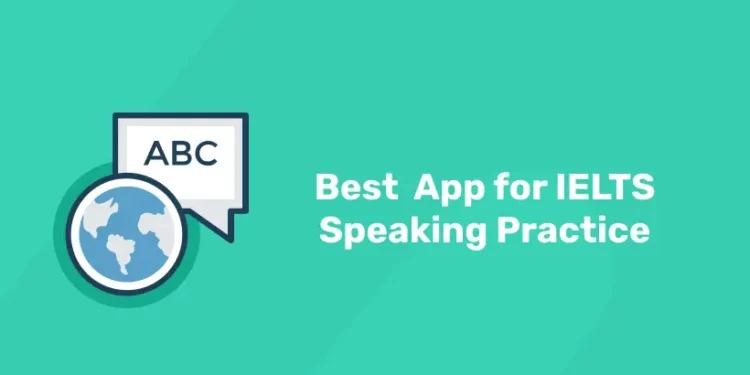Table of Contents
Preparing for the IELTS speaking test can be a daunting task, but having the right tools at your disposal can significantly enhance your practice and boost your confidence. The IELTS speaking section evaluates your ability to communicate effectively in English, making it essential to engage in regular speaking practice to refine your skills. With the proliferation of mobile applications designed specifically for language learners, finding the best app for IELTS speaking practice can make all the difference in your preparation journey.
Master the IELTS Exam with Online Coaching – Enroll Today!
Introduction
Choosing the right app for IELTS speaking practice can make a significant difference in your preparation. Each of these apps offers unique features that cater to different learning styles and needs. By incorporating these tools into your study routine, you can enhance your speaking skills, simulate real test conditions, and ultimately increase your chances of achieving your desired score in the IELTS speaking module.
In this blog, we will explore some of the most effective apps available for IELTS speaking practice. These apps offer a range of features, including interactive speaking exercises, sample questions, and instant feedback, allowing you to simulate the test environment and improve your fluency and pronunciation. Whether you are a beginner or looking to polish your skills before the exam, these tools will provide valuable resources to help you excel in the IELTS speaking test. Let’s dive into the best options that can help you achieve your desired score!
Understanding IELTS Speaking Module
The IELTS speaking module is a crucial component of the International English Language Testing System (IELTS), designed to assess a candidate’s spoken English proficiency. This module is structured to evaluate how effectively a candidate can communicate in English, focusing on various aspects such as fluency, vocabulary, grammar, and pronunciation. Here’s a detailed overview of the IELTS speaking module:
1. Structure of the IELTS Speaking Test
The IELTS speaking test is divided into three parts and typically lasts between 11 to 14 minutes.
- Part 1: Introduction and Interview (4-5 minutes) In this initial segment, the examiner will introduce themselves and ask the candidate to do the same. Candidates will answer questions about familiar topics such as their hometown, family, work, studies, and interests. This part aims to help candidates feel comfortable and to assess their ability to speak on everyday topics.
- Part 2: Long Turn (3-4 minutes) In this section, candidates receive a task card with a specific topic and some prompts. They have one minute to prepare and make notes before speaking for 1-2 minutes on the topic. This part tests the candidate’s ability to speak at length about a subject and organize their thoughts coherently.
- Part 3: Discussion (4-5 minutes) The final part involves a more in-depth discussion between the candidate and the examiner, based on the topic introduced in Part 2. This section assesses the candidate’s ability to engage in a conversation, express opinions, justify their views, and provide detailed responses. The questions may require candidates to think critically and analyze issues.
2. Assessment Criteria
The IELTS speaking module is evaluated based on four key criteria:
- Fluency and Coherence: This assesses how smoothly and logically a candidate can speak. Examiners look for the ability to express ideas clearly and maintain a flow in conversation without excessive pauses or hesitations.
- Lexical Resource: This criterion evaluates the range and appropriateness of vocabulary used by the candidate. Examiners consider how well candidates can express their thoughts and ideas using varied vocabulary, as well as their ability to paraphrase and use idiomatic expressions.
- Grammatical Range and Accuracy: This measures the candidate’s grammatical knowledge and their ability to use a variety of grammatical structures accurately. Candidates should demonstrate the ability to form correct sentences, use appropriate tenses, and convey complex ideas.
- Pronunciation: This assesses how easily a candidate can be understood. Examiners consider the clarity of speech, the ability to use intonation and stress effectively, and the correct pronunciation of words.
3. Tips for Success
To excel in the IELTS speaking module, candidates should consider the following tips:
- Practice Regularly: Engage in regular speaking practice with friends, tutors, or language exchange partners to build confidence and fluency.
- Familiarize Yourself with the Test Format: Understanding the structure of the test and the types of questions asked will help reduce anxiety and improve performance on test day.
- Expand Your Vocabulary: Work on building a diverse vocabulary to express ideas more effectively. Reading widely and learning new words can be beneficial.
- Record Yourself: Listening to recordings of your speaking can help identify areas for improvement, such as pronunciation or coherence.
- Stay Calm and Engaged: During the test, maintain a calm demeanor and engage actively with the examiner. Treat it as a conversation rather than an interrogation.
Master the IELTS Exam with Online Coaching – Enroll Today!
Key Features to Look for in an IELTS Speaking Practice App
When selecting an IELTS speaking practice app, it’s important to choose one that offers a comprehensive set of features to enhance your preparation. Here are the key features to look for in an effective IELTS speaking practice app:
1. Realistic Speaking Simulations
An ideal app should provide realistic speaking simulations that mimic the actual IELTS speaking test format. This includes practicing the three parts of the speaking test—introduction and interview, long turn, and discussion—so you can become familiar with the types of questions and the flow of the conversation.
2. Instant Feedback and Evaluation
Look for apps that offer instant feedback on your speaking performance. This feature can help you identify areas for improvement, such as pronunciation, fluency, and coherence. Some apps may use AI technology to analyze your speech and provide suggestions on how to enhance your responses.
3. Sample Questions and Prompts
A good IELTS speaking practice app should include a wide range of sample questions and prompts covering various topics. This variety helps you prepare for the unpredictability of the test and enables you to practice articulating your thoughts on different subjects effectively.
4. Recording and Playback Functionality
The ability to record your responses and listen to them later is crucial for self-assessment. This feature allows you to evaluate your fluency, pronunciation, and overall delivery. Analyzing your recordings can help you track your progress and make necessary adjustments to your speaking techniques.
5. Progress Tracking and Analytics
Choose an app that includes a progress tracking feature, which allows you to monitor your improvement over time. This could involve tracking metrics such as speaking duration, fluency scores, and vocabulary usage, helping you stay motivated and focused on your preparation goals.
6. Expert Tips and Strategies
An effective IELTS speaking practice app should provide expert tips and strategies for success. This may include advice on how to structure your answers, handle challenging questions, and manage test anxiety. Access to instructional videos or articles can also enhance your understanding of the speaking test.
7. User-Friendly Interface
A user-friendly interface is essential for a seamless learning experience. The app should be easy to navigate, with intuitive controls for recording, playback, and accessing various practice materials. A clean design can help you focus on your practice without distractions.
8. Community and Peer Interaction
Some apps offer community features that allow users to connect with peers for practice. This can include features such as discussion forums, group practice sessions, or one-on-one speaking practice with other users. Engaging with a community can provide additional support and motivation during your preparation.
9. Customization Options
Look for apps that allow you to customize your practice sessions according to your needs. This could involve selecting specific topics, difficulty levels, or time limits for practice sessions, enabling you to tailor your preparation to suit your learning style and goals.
10. Offline Access
Having offline access to practice materials can be a significant advantage, allowing you to study anytime and anywhere without relying on an internet connection. This feature is particularly useful for busy learners or those who travel frequently.
Top 5 Apps for IELTS Speaking Practice
Here are the top five apps for IELTS speaking practice that can help you enhance your speaking skills and prepare effectively for the test:
1. Entri App
The Entri App is a popular learning platform designed to help students prepare for various competitive exams, including the IELTS. With a user-friendly interface and a wealth of resources, the Entri App is particularly useful for IELTS speaking practice.
Entri App is a valuable resource for IELTS speaking practice, offering a range of features designed to enhance preparation and boost confidence. With its comprehensive question bank, video tutorials, mock tests, and community support, the app equips users with the tools they need to excel in the IELTS speaking module.
Key features and functionalities:
1. Comprehensive IELTS Preparation
The Entri App provides a dedicated section for IELTS preparation, covering all four modules: Listening, Reading, Writing, and Speaking. Within the speaking section, users can find specific resources tailored to help them excel in the speaking test.
2. Practice Questions and Prompts
The app offers a wide range of sample questions and prompts that reflect the types of questions encountered in the actual IELTS speaking test. This feature allows users to practice their responses to typical questions they might face during the exam, such as personal experiences, opinions, and hypothetical scenarios.
3. Video Lessons and Tutorials
Entri includes video lessons and tutorials led by experienced instructors, providing insights into effective speaking strategies and techniques. These videos cover essential topics such as structuring answers, enhancing fluency, and improving pronunciation, giving users a solid foundation for their speaking practice.
4. Mock Speaking Tests
The app allows users to participate in mock speaking tests that simulate the actual IELTS speaking interview experience. This feature helps candidates familiarize themselves with the test format and manage their time effectively while speaking.
5. Feedback and Assessment
Entri enables users to record their speaking responses and offers features for self-assessment. While the app may not provide automated feedback, users can listen to their recordings to identify areas for improvement, such as pronunciation and coherence.
6. Progress Tracking
To help users monitor their preparation, the Entri App includes progress tracking features that allow candidates to assess their improvement over time. This can help motivate learners and provide a clear understanding of their readiness for the IELTS speaking test.
7. Community Support
The Entri App fosters a sense of community among users, allowing them to engage with peers who are also preparing for the IELTS. This interaction can provide additional motivation and support, as users share tips and experiences.
8. Accessible Learning
Available on both Android and iOS devices, the Entri App allows users to practice anytime and anywhere. This flexibility is especially beneficial for busy learners who may need to fit their study sessions into a packed schedule.
2. IELTS Speaking Assistant
This app is specifically designed for IELTS speaking preparation and offers a wealth of resources. It features a comprehensive database of sample questions and answers, practice exercises for each part of the speaking test, and tips from IELTS experts. The app also includes a recording feature, allowing you to practice your speaking skills and listen to your responses for self-assessment.
3. IELTS Prep App by British Council
The IELTS Prep App from the British Council is a comprehensive resource for all four modules of the IELTS test, including speaking. It includes sample questions, practice exercises, and instructional videos that cover speaking strategies. The app also allows users to track their progress and provides tips on how to improve fluency and coherence during the speaking test.
4. Speaking for IELTS by Collins
Collins’ Speaking for IELTS app focuses specifically on the speaking section of the test. It includes a range of practice tasks, model answers, and tips to help you improve your speaking skills. The app features a unique scoring system that allows users to assess their performance and track their progress over time. Additionally, it provides practice exercises tailored to different levels of proficiency.
5. IELTS Test Pro
IELTS Test Pro is an all-in-one app that covers all modules of the IELTS exam, including speaking. It features a vast question bank with sample prompts and practice tests that simulate the real test experience. The app also includes listening and reading practice, vocabulary exercises, and a progress tracker to help you monitor your improvement in speaking and other skills.
Conclusion
In conclusion, preparing for the IELTS speaking test requires dedicated practice and the right resources to enhance your skills and boost your confidence. The top five apps for IELTS speaking practice—IELTS Speaking Assistant, IELTS Prep App by British Council, IELTS Speaking Practice by Magoosh, Speaking for IELTS by Collins, and IELTS Test Pro—offer a wealth of features tailored to help you excel in this crucial module.
These apps provide a variety of practice questions, expert tips, and the ability to record and assess your performance, making them invaluable tools for any IELTS candidate. By incorporating these apps into your study routine, you can simulate real test conditions, refine your speaking abilities, and track your progress over time. With consistent practice and the right strategies, you’ll be well-prepared to approach the IELTS speaking test with confidence, ultimately helping you achieve your desired score and paving the way for your future academic and professional endeavors.









